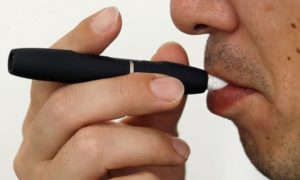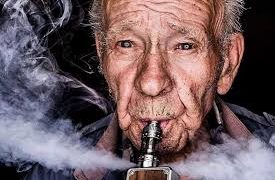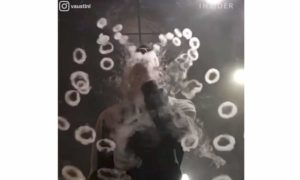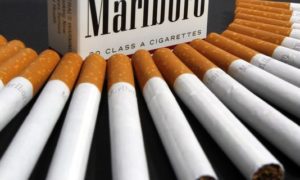
DETROIT LAKES, Minn. - Bad news for e-cigarette fans: Vape shop retailers can no longer give out free samples and are limited in their ability to mix e-liquids to create new flavors.


It’s all courtesy of the federal Food and Drug Administration, which has issued new regulations governing the manufacture and sale of electronic cigarettes.
An e-cigarette is a battery-powered device that converts liquid nicotine into a mist, or vapor, that the user inhales.
There's no fire, no ash and no smoky smell. E-cigarettes do not contain all of the harmful chemicals associated with smoking tobacco cigarettes, like carbon monoxide and tar.
When they go into full effect in two years, the new regulations will “eliminate 99.9 percent of the vaping industry,” said Jenny Hoban, owner of Masterpiece Vapors in Detroit Lakes and Perham.
Less controversial aspects of the regulations went into effect Monday. They include a ban on selling to minors, identification requirements and prohibiting free samples.
Hoban said she has prohibited sales to minors since she opened in Perham in July of 2013.
“We as an industry have self-regulated from Day 1…before it was a Minnesota state statute in January of 2015 or FDA requirement,” she said.
The more onerous regulations are yet to come, she said. E-cigarette manufacturers now have two years to go through a long and expensive application process for each and every product that they intend to sell after 2018.
Their only loophole would be to prove “substantial equivalence” to a product that existed before the Tobacco Control Act’s “deeming date” of Feb. 15, 2007. But that would be nearly impossible since e-cigarettes are such a new technology, Hoban said.
The FDA estimates the applications will take 5,000 hours and cost $330,000 each, but Hoban said some estimates put the cost at as much as $1 million for each product, which includes every potential combination of device, flavor and nicotine strength.
The upshot will be that only the wealthiest corporations, such as Big Tobacco, will be able to afford to stay in the e-cigarette business, Hoban says, and she fears they will sell the least healthy, most addictive blend of e-liquids.
Hoban says the smaller vape shops that offer a good selection of customizable devices and liquids will not survive the new FDA regulations and will be forced to close shop.
To drive home the point, she didn’t open her store in Detroit Lakes on Monday and held a mock “out of business” event there instead.
That alarmed customers, inspiring lots of interest in House Bill 2058, which would essentially grandfather in existing e-cigarette products.
The end result of the FDA regulations, she says is that those who use e-cigarettes will pay more for a limited selection of products, and the e-cigarette industry as a whole will see restricted competition and stifled innovation.
For its part, the FDA says the new regulations are designed to make regulated tobacco products less accessible and less attractive to youth.
“Every day, more than 2,600 kids try their first cigarette and nearly 600 kids become cigarette daily smokers,” the agency said on its website. “Additionally, the CDC and FDA found that during 2011-2015, e-cigarette use rose from 1.5 percent to 16 percent among high school students.”
Many of these children will become addicted before they are old enough to understand the risks, the agency added. “As a retailer, you play an important role in protecting children and adolescents by complying with the law and regulations.”
Ironically, Hoban believes the new regulations will do more to help Big Tobacco and Big Pharma, since it will limit smokers’ ability to quit the habit by switching to e-cigarettes.
“Since we’ve opened we’ve been able to help thousands of people in this area quit cigarettes,” she said. “We’ve had people on their last legs – they tried the patch, they tried the meds, they tried the gum, they tried hypnosis, they tried everything … we’ve seen people go from smoking two packs a day to quitting cigarettes almost immediately.”
Hoban said older people are benefitting from e-cigarettes.
“One guy had been smoking 50 years, he started at age 8 – he was able to quit when he first started vaping. We had a woman in her 90s with COPD symptoms – they cleared up altogether (when she switched to e-cigarettes)...People are so excited about finding something to quit a habit they thought they’d take with them to the grave.”
Hoban said the new regulations cripple her store’s ability to work with customers trying to quit smoking.
“Prior to the regulations we had the ability to tailor (to their needs),” she said. “We could customize flavors and nicotine levels; we could also help customers set up the product and walk them through it so they knew how to use it.”
She believes the FDA regulations were heavily influenced by large corporations, including pharmaceutical companies that sell expensive cancer drugs and make money off smokers that become patients.
“This is Big Pharma trying to protect their future,” she said. “The last few years vaping has exploded. It’s a multibillion dollar a year industry in the United States alone. This is the little man against big corporations, whether people vape or not, this is about overreaching government agencies destroying small business. This is not what America is about.”
Click here to view original web page at www.duluthnewstribune.com






















